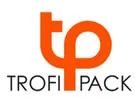Trofi Pack has been operational at its new packaging facility in the Dutch village of Den Hoorn since the spring of 2020. The company is already in its third expansion phase. "Sometimes, we have to pinch ourselves. Fortunately, we're growing very gradually, so it's easy to manage, and the construction didn't affect our active process," begins Harry van der Hout.

Trofi Pack's new DC spans 23,000 m2, but it is not stopping there. Co-shareholder and neighbor Van der Helm is expanding considerably, too, and will, thus, move to Alpen aan den Rijn in 2024. That gives Trofi Pack access to an additional 18,000 m2 from next year. That will be divided between some 10,000 m2 of cold storage and ripening cells and an 8,000 m2 packaging department. "We couldn't have imagined this six years ago when we made our plans."

The director attributes choices made as an essential reason for this growth. "We're very selective in the products we package and ripen. Customers appreciate that; that specialism benefits European retail chains who know they can come to us for products like perfectly ripened avocados and mangoes," he says.

"Despite all the new ripening and sorting technology, our ripeners' expertise remains a vital factor. We have three ripeners who spend the whole day cutting into avocados. If there's any doubt, the batch is used for guacamole. We now supply tray-packed premium avocadoes to a German supermarket. Compared to the Netherlands, where two avocados in a flow pack are very common, that's far less wasteful. Shoppers don't squeeze the avocados."

Harry says the exotics category's growth is far from over. "The Ready to Eat segment still has particularly large growth potential. The avocado market has grown tremendously over the past decade, but consumption in countries such as the Netherlands and Germany is still miles behind, say, Scandinavia."
"Sweet potatoes are also an important branch, and we pack a lot of grapes during the overseas season," says Harry, who does not see expanding into, for instance, a blueberry line as something in the pipeline. "Those products typically peak in the import season. We want to ensure we have a good spread of volume year-round."

Van der Hout prefers limiting the number of clients too. "I think having a few big customers is better than 50 small ones. People sometimes consider me strange for that, but I firmly believe it. If you have 50 clients, 48 always think they're being short-changed. But then you must entirely unburden your customers, from sea freight and transport to customs clearance, packaging, and order picking. We specialize in all that," he explains.

The facility now houses 25 ripening cells, 24 cooling cells, and 23 packaging lines. ULMA supplied the top seal and flow pack machines, and Viscon developed a grape line. Also at the packaging site are four Newtec netting machines, an automatic netting line from MAF Roda, and a JASA line for cardboard sleeves. For sorting, there are two lines from Aweta, and MAF Roda is currently developing an advanced avocado sorting machine that selects the product by firmness and internal quality.

"We have 75 permanent and 75 temporary employees. Eventually, through automation, we hope to reduce the number of temporary workers to 25. That's often easier said than done, though. You can certainly recover your investment over several years," Harry explains, "but it must also fit within the process. Our trade will always include manual labor, but things like stacking pallets, boxes, and banding are increasingly done automatically. Also, we use robotic arms to place products on the line."

Last year's sky-high energy prices were challenging. "Those are more under control now. The building's 8,000 solar panels are doing a good job." Harry also cites attracting and retaining good staff as challenging. "We, therefore, treat our staff well. For example, they can train here on-site in a professional gym. If the company's doing well, the staff should notice that too," he concludes.

 For more information:
For more information:
Trofi Pack
Harry van der Hout
10 Harnaschdreef
2635 BT, Den Hoorn, NL
Tel: +31 (0) 174 266 100
Email: h.vdhout@trofipack.nl
Website: www.trofipack.nl
